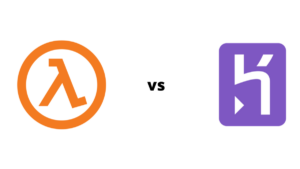AWS Lambda vs. Heroku: What’s the Difference?
Introduction Looking to run your applications in the cloud? AWS Lambda and Heroku are two good options. While AWS Lambda is a serverless computing platform, Heroku web apps typically use a more traditional architecture. So what’s the difference between Heroku vs. AWS Lambda, and how can you choose between them? Achieve Cloud Elasticity with Iron Speak to us to find how you can achieve cloud elasticity with a serverless…
Read MoreHeroku vs. Docker: What’s the Difference?
Introduction Heroku and Docker are both highly popular container solutions. They deploy software in containers, which are virtual “packages” that bundle applications’ source code together with their dependencies and configurations. This ensures that they always run predictably in different environments. But what’s the difference between Heroku and Docker, and what are the Heroku vs. Docker issues you should know about? Achieve serverless computing with Iron Find out how IronWorker’s mature, feature-rich…
Read MoreAzure vs. Heroku
Introduction Looking for a place to deploy and run your applications in the cloud? Microsoft Azure and Heroku are two of the most popular PaaS cloud computing options. But what’s the difference between Azure and Heroku, and what are the most important Azure vs. Heroku issues? Keep reading for the answers. Achieve Cloud Elasticity with Iron Find out how IronWorker’s mature, feature-rich serverless computing platform can help make your applications…
Read MoreGoogle Cloud Run vs. Heroku
Choosing the right serverless platform for containerised applications can be tough. We’ve picked two of the most popular: Heroku, one of the first Platform as a Service (PaaS) for developers, and the relatively new Google Cloud Run, to see how each performs for Docker container deployment. Achieve Cloud Elasticity with Iron Speak to us to…
Read MoreAWS Lambda vs. Fargate Containers | IronWorker
Docker container technology is open source, which means it’s possible to deploy your containers on a range of platforms. Both AWS Fargate and Lambda support Docker images, albeit in slightly different ways. So, how do you know which one to use?
Read MoreGoogle Cloud Run vs. Azure Container Instances
Deploying your container images on a serverless platform means less resource management and maintenance for you or your business. But which platform is the best? We explore Google Cloud Run and Microsoft Azure Container Instances (ACI) and discuss which cloud providers perform well with Docker images and which is the best value. Achieve Higher productivity…
Read MoreContainers vs. Serverless Computing
The five key differences between containerization and serverless computing: Cost — You must pay for serverless environments hosted in the cloud, whereas a container can be set up for free. However, containers have ongoing management costs, which can be expensive — even if no one is using the application. Longevity – Serverless functions live short, which also provide agility and flexibility. Containers…
Read More

